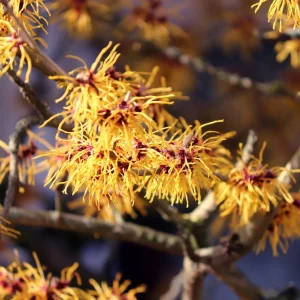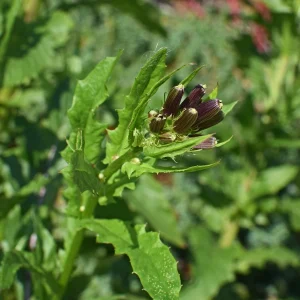Fatty Liver
Fatty liver, also known as hepatic steatosis, is a condition where excess fat builds up in the liver cells. This can happen due to various reasons, including obesity, high cholesterol, type 2 diabetes, excessive alcohol consumption, or certain medications. Fatty liver itself usually doesn’t cause symptoms, but if left untreated, it can progress to more severe liver conditions like non-alcoholic fatty liver disease (NAFLD) or even liver cirrhosis.
Managing fatty liver involves lifestyle changes such as maintaining a healthy weight, eating a balanced diet low in saturated fats and refined sugars, regular exercise, limiting alcohol intake, and managing underlying conditions like diabetes or high cholesterol.
When it comes to medicinal plants, several have shown promise in supporting liver health and potentially aiding in the management of fatty liver:
- Milk Thistle (Silybum marianum): One of the most researched herbs for liver health, milk thistle contains an active compound called silymarin, which has antioxidant and anti-inflammatory properties. It’s believed to help protect liver cells from damage and promote their regeneration.
- Dandelion (Taraxacum officinale): Dandelion root is traditionally used as a liver tonic. It may support liver function by promoting bile production and flow, aiding in the digestion of fats, and acting as a gentle diuretic to help remove toxins from the body.
- Turmeric (Curcuma longa): Curcumin, the active compound in turmeric, has potent anti-inflammatory and antioxidant effects. Research suggests it may help reduce liver inflammation and prevent fat accumulation in the liver.
- Artichoke (Cynara scolymus): Artichoke leaf extract has been studied for its potential to support liver function by increasing bile production and flow, which aids in the digestion and elimination of fats.
- Ginger (Zingiber officinale): Ginger has anti-inflammatory properties and may help reduce liver damage caused by inflammation. It also has antioxidant effects that could protect liver cells from oxidative stress.
It’s important to note that while these medicinal plants may offer some benefits for liver health, they should not replace conventional medical treatment. Always consult with a healthcare professional before starting any herbal supplements, especially if you have a medical condition or are taking medications. Additionally, incorporating these herbs into a balanced diet and healthy lifestyle may complement other treatments for fatty liver.
Top 20 recommendations:
- Maintain a Healthy Weight: Aim for gradual weight loss if overweight or obese, as even a modest reduction in weight can improve liver health.
- Follow a Balanced Diet: Consume a diet rich in fruits, vegetables, whole grains, and lean proteins. Limit saturated fats, refined sugars, and processed foods.
- Exercise Regularly: Engage in moderate aerobic exercise such as brisk walking, cycling, or swimming for at least 30 minutes most days of the week.
- Limit Alcohol Consumption: If you drink alcohol, do so in moderation. For individuals with fatty liver disease, it’s often recommended to abstain from alcohol completely.
- Manage Diabetes: Keep blood sugar levels under control through diet, exercise, medication, and regular monitoring.
- Control Cholesterol Levels: Maintain healthy cholesterol levels through diet, exercise, and medication if necessary.
- Avoid Rapid Weight Loss: Gradual weight loss is preferred to prevent the worsening of fatty liver.
- Stay Hydrated: Drink plenty of water throughout the day to support overall health and liver function.
- Quit Smoking: Smoking can worsen liver health and increase the risk of liver disease progression.
- Limit Processed Foods: Reduce intake of processed foods high in added sugars, refined carbohydrates, and unhealthy fats.
- Eat Foods Rich in Omega-3 Fatty Acids: Include sources of omega-3 fatty acids such as fatty fish (salmon, mackerel, sardines), flaxseeds, and walnuts in your diet.
- Monitor Medications: Some medications may worsen fatty liver or interact with other treatments. Consult with a healthcare professional about the safety of your medications.
- Get Vaccinated: Vaccinations for hepatitis A and B can help prevent additional liver damage.
- Reduce Stress: Practice stress-reduction techniques such as mindfulness, meditation, yoga, or deep breathing exercises.
- Avoid Toxins: Minimize exposure to environmental toxins and chemicals that can harm the liver.
- Limit Fructose Consumption: High intake of fructose, often found in sugary beverages and processed foods, may contribute to fatty liver.
- Consider Herbal Supplements: Certain medicinal herbs such as milk thistle, dandelion, turmeric, artichoke, and ginger may support liver health. Consult with a healthcare professional before adding herbal supplements to your regimen.
- Maintain Regular Medical Check-ups: Regular monitoring of liver function and overall health is important for early detection and management of fatty liver disease.
- Practice Portion Control: Be mindful of portion sizes to prevent overeating and excess calorie intake.
- Seek Support: Joining a support group or working with a healthcare provider can provide valuable guidance and encouragement on managing fatty liver disease.



